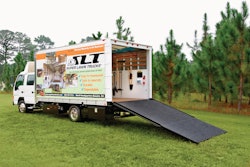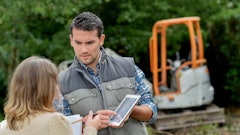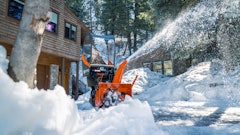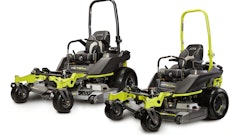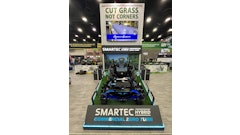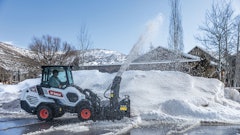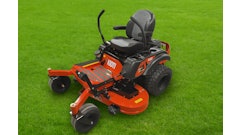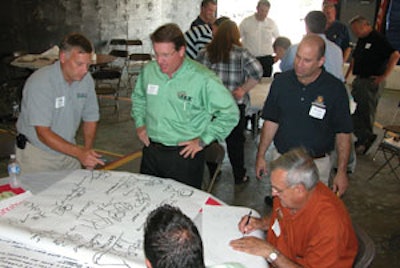
As a business owner, it’s important to remember that you don’t have to go it alone. Plenty of business help is available from a variety of resources. This summer and fall, landscape contractors from around the country have been finding that out first hand, thanks to a unique collaborative effort from a half-dozen of the green industry’s brightest minds.
The partnership of green industry providers consists of JP Horizons, Christmas Décor, Modeco Systems, Mulch Mule, Super Lawn Trucks and Weed Man. Dating back to mid-June, the group has been conducting a series of day-long training events in cities across the U.S., including Boston, Colorado Springs and Canton, OH. Plans for expansion of the “Smart Companies Face-to-Face Tour” in 2010 are underway. Visit jphorizons.com for more information.
Through peer networking and interactive learning, topics of the Face-to-Face events have included sales solutions, fleet management, improving work processes and administration. Typically held at the facility of a leading landscape company, the events also include a facility tour.
“These smaller groups of around 20 or 30 contractors provide a great way to learn through the exchange of knowledge,” says Jim Paluch of JP Horizons. Plus, the sponsoring companies each have had experience running successful landscape companies of their own. “It’s a natural fit,” Paluch adds.
“Creating systems and work processes is a hard concept for a lot of owners to grasp,” says Jennifer Lemcke of Weed Man. “So many contractors are working to survive what’s going on right now. But they need to be working smarter, thinking of ways to make sure their companies will prosper into the future.”
Back on September 15, Sebert Landscaping hosted a Smart Companies event at its Romeoville, IL, facility—one of Sebert’s five Chicago-area branches. Several local landscapers participated, along with contractors from Michigan, Indiana, Wisconsin, Texas and Canada. Following are some of the best practices that emerged from the event.
SELLING IN THE ‘NEW ECONOMY’
In reviewing the process of generating and closing sales leads, the Smart Companies agreed that “relationship building” must happen almost immediately in the sales process, particularly if you’re targeting commercial clientele. Take both a professional and personal interest in the client.
Become active in local organizations such as the Chamber of Commerce or Building Owners & Managers Association (BOMA). Asking prospective clients if they’re a member of an organization you’re already a part of is a great way to establish a common bond. And if they’re not, it’s an effective way to act as a resource. Ask them, “Would you like to accompany me to our next meeting in a couple weeks to see how becoming a member yourself could help your company?”
Beyond relationship building, follow-up is huge these days as more customers are inviting more bids from more contractors. While most commercial clients don’t expect a proposal immediately, two weeks is probably too long. Review the steps in your sales process to make sure you’re being as efficient as possible. Can your sales reps be trained and empowered to make more decisions on their own, eliminating delays caused by waiting for manager approval, etc.?
On the residential design/build side, it’s important to get a handle on the customer’s budget early in the sales process—perhaps even during the initial contact. In today’s difficult climate, some contractors say they’re hesitant to do so for fear of “scaring the customer away.” An effective tactic is to point out how your company is experienced in designing and building a variety of landscapes for a variety of customers. Ask the prospect, “Would you say spending $100,000 on a landscape is beyond what you’re looking to do?” Then you can work your way down, if need be, to get a picture of what the prospect is willing to spend.
PAPERLESS PAYROLL
Many landscape companies, including Sebert Landscaping, have saved thousands of dollars and man-hours by implementing TimeScape from Modeco Systems. Using a small handheld scanner, crews clock in and out at jobsites, eliminating manual, written time sheets that are more prone to inaccuracy and often bring administrative staff to tears.
PAPERLESS FLEET MAINTENANCE
The Smart Companies agreed that a similar system can be implemented to manage assets. By bar coding your trucks, mowers and other equipment, maintenance intervals are more easily established, machines are more easily tracked through the repair process, and units that have reached the end of their productive life are more easily identified—before they start costing you money in needless downtime and repairs.
CREW ROUTING TIPS AND TOOLS
Some of the above mentioned best practices are especially helpful if you’re a larger company with lots of employees, trucks and equipment. But regardless of your company’s size, the Smart Companies agreed that proper crew routing can have an almost immediate effect on productivity and profits.
Each of Sebert Landscaping’s five branches has its own crews to service its own defined geographic territory. Currently, the company utilizes Google Earth to organize routes. After garnering feedback from the many contractors in attendance, the company agreed that the implementation of some kind of mapping software, such as Mapping Assistant from Real Green Systems, is worth looking into.
Whichever routing method you use, even if you’re simply sticking pins in a big map on the wall, you likely encounter the challenge of servicing a property that is a good distance from your facility. The Smart Companies agreed that an effective strategy is to have the crew head out to that property first thing in the morning. That way they can knock out that property first, then work their way back home throughout the course of the day. During evening rush hour, they won’t have as far to drive, cutting down on profit-sucking windshield time.
Plenty of other topics were also discussed by the Smart Companies at Sebert Landscaping, including how to improve equipment and safety training. After more than eight hours of interactive learning, each of the contractors in attendance returned to their businesses armed with a long list of ideas to help take their businesses to the next level. Therein lies the challenge: Where do you begin?
“Ask yourself, ‘What’s the simplest thing I can do to begin to move my business in the right direction?’” Paluch asks. “So many contractors try to get it all figured out at once. Even if it’s something as basic as cleaning up your desk, set goals to get yourself moving in the right direction.”






